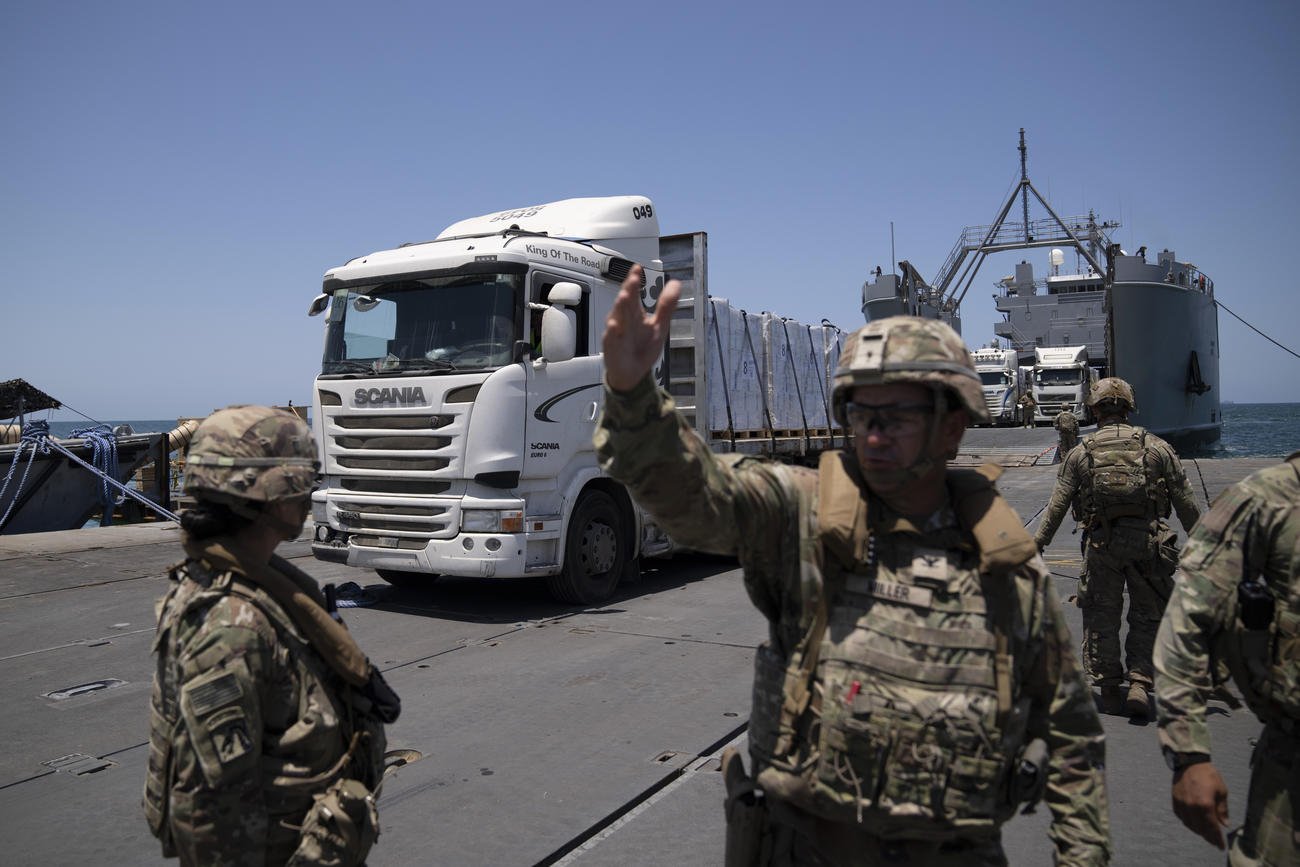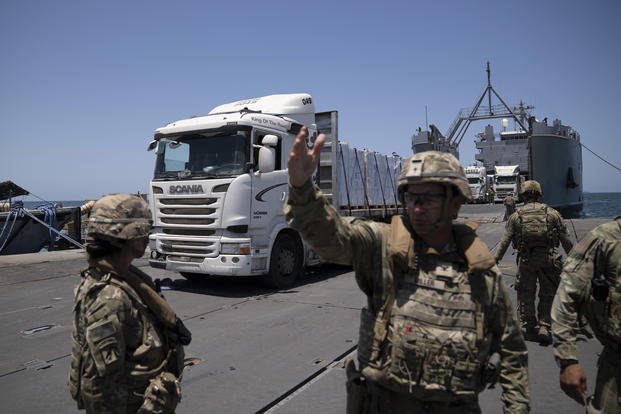

The Pentagon said Friday that it will remove the pier it is using to deliver aid into Gaza for the third time since it was installed due to weather and high seas, amid mounting criticism of the operation on Capitol Hill.
“Temporarily relocating the pier will prevent potential structural damage that could be caused by the heightened sea state,” Pentagon spokeswoman Sabrina Singh said at a briefing Friday to reporters.
The move comes as critics in Congress continue to call for an end to the pier’s mission and aid has been slow to move off the beach and into the hands of starving Palestinians caught in the middle of Israel’s brutal offensive against Hamas. However, despite these challenges, the pier has still become a critical lifeline for aid into Gaza.
Read Next: House Approves $2.5 Billion for Junior Enlisted Raises, Which May Be $800 Million Too Little
Republican lawmakers have called the troubled pier — a Joint Logistics Over-the-Shore, or JLOTS, operation by the Army — a “logistical nightmare,” failure and waste of taxpayer money.
“Three and a half months since the president’s announcement of a maritime corridor for Gaza and at least $230 million wasted, the operation has been riddled with setbacks, sidelined more often than operational, and can only be classified as a gross waste of taxpayer dollars,” Rep. Mike Rogers, R-Ala., the chairman of the House Armed Services Committee, said in a statement Thursday.
The House moved two bills this month that would defund the pier operation, potentially later this year, after President Joe Biden first announced the effort in March during his State of the Union address.
The pier mission has been a source of controversy and debate since its start in April when one of the ships set to carry supplies was forced to turn back to port after experiencing a fire in its engine room. Another Army ship got held up in Tenerife — a small island that is part of the Canary Islands cluster off the west coast of Africa — leading to concerns about the readiness of the Army’s fleet of watercraft.
Then, as troops readied the pier for installation, high seas caused the first of many weather-related delays. Since then, several reports and experts noted that the pier was being asked to operate in an area and under conditions for which it wasn’t designed.
After about a week of operations, Pentagon officials conceded that some of the first truckloads of aid were not even making it to the Palestinians — they were being looted off the trucks as they left the staging area on the beach.
Then, a storm broke apart the pier and forced its first removal for repairs while also beaching several Army boats for hours.
Yet, despite being sidelined for more than two weeks out of the pier’s three-and-a-half month deployment, defense officials say that more than 19 million pounds of aid has now been delivered to the beach to date.
“The pier provided the second-highest volume of aid from any entry point into Gaza this past week,” according to Singh, who said 10 million pounds was delivered just in the last week.
However, a good portion of that aid is still on the beach, filling up a holding area.
“We are pretty close to full on the marshaling yard in terms of how much aid is there,” Singh said.
The United Nations World Food Program — the agency that was tasked with moving the aid to Palestinians — halted its work in early June over safety concerns.
Pentagon officials have stressed for months that the pier was never intended to be the primary or most effective way to get aid into Gaza. The hope was that the pier would be a stopgap until Israel agreed to open its land border crossings to aid.
The fact that the pier has become such a productive route for aid suggests that those efforts have not been successful.
In addition to Israeli officials keeping many land crossings shut, reporters found that Israeli settlers have taken to attacking aid shipments at border crossings, and some aid groups have accused Israeli security forces of tipping off settlers to convoy routes, which also allowed them to attack or block the shipments.
Singh conceded that aid is “not flowing the way it should.”
On Tuesday, ABC News reported that 13.6 million pounds have made it to a United Nations-run food warehouse.
Regardless, for critics like Rogers, the effort is not enough.
“I urge the administration to immediately cease this failed operation before further catastrophe occurs and consider alternative means of land- and air-based humanitarian aid delivery,” he wrote in a letter to top Biden administration officials.
Singh said that there was no firm date for when the pier would be moved back into place and added that the decision would also be based in part on the capacity of the marshaling yard and how much aid is waiting to be distributed at the collection point in Cyprus.
“We do need more aid to come into Cyprus,” Singh said.
Related: US Soldiers Were Stuck in Beached Boats Along Gaza After Storms Broke Apart Aid Pier
